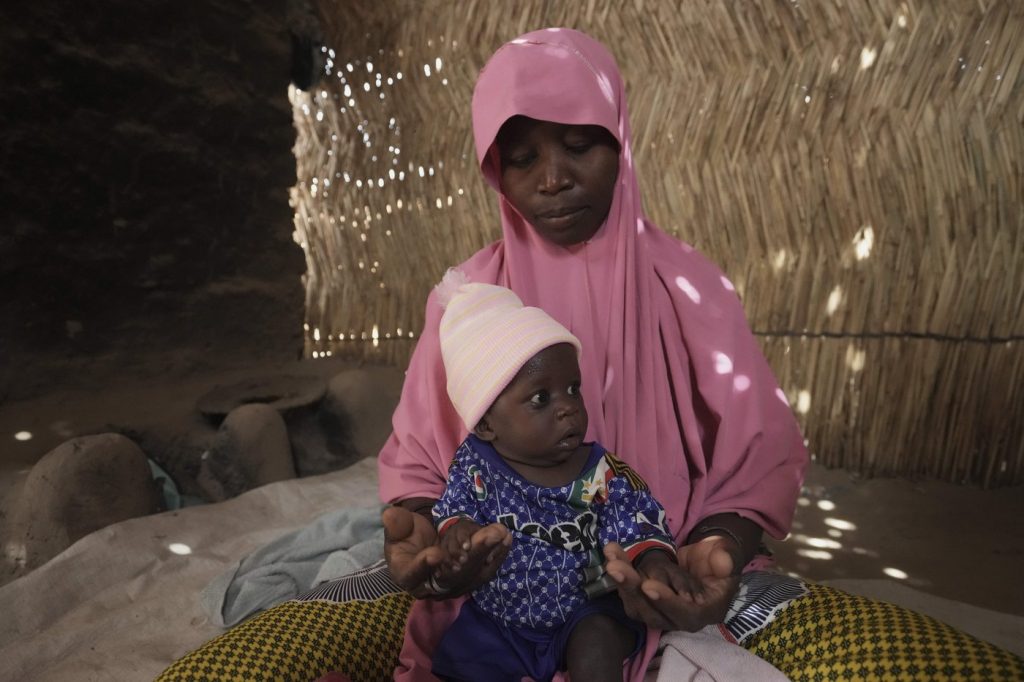DIKWA, Nigeria (AP) — Yagana Bulama, a 40-year-old woman, cradles her surviving infant amidst the shadows of a thatched shelter, lamenting the loss of one of her twins to malnutrition. Bulama is among approximately 400,000 displaced individuals in Dikwa, Borno state, struggling against rising starvation due to significant cuts in international funding, which have severed essential lifelines for communities affected by Boko Haram insurgency.
“Feeding is severely difficult,” Bulama expressed, recounting her past as a farmer prior to being forced to flee her village. The Nigerian military has restricted movement to a designated “safe zone,” limiting farming opportunities for displaced families relying heavily on humanitarian aid.
For years, the United States Agency for International Development (USAID) served as the backbone of aid responses in northeastern Nigeria, supporting various non-government organizations in delivering food, shelter, and healthcare. However, the Trump administration has drastically slashed more than 90% of USAID's foreign aid contracts and reduced overall assistance by $60 billion this year, critically impacting programs aimed at children.
Earlier, Bulama lost three young triplets to hunger before they could reach therapeutic feeding centers in Dikwa. Upon the birth of her twins last August, both were underweight. They were enrolled in a calorie-dense paste treatment program by Mercy Corps, aimed at addressing severe acute malnutrition, which has now been abruptly ended due to USAID funding cuts. Two weeks after the program's cessation, one ofBulama's twins tragically passed away.
"I don’t want to bury another child," Bulama stated, her voice heavy with grief and apprehension for the future.
The cuts have had global implications, with approximately 50% of therapeutic foods for malnourished children funded by USAID, and 40% of supplies produced in the United States, according to Shawn Baker, chief program officer at Helen Keller Intl. He cautioned that these changes could lead to 1 million children missing vital treatment for severe malnutrition, potentially resulting in an additional 163,500 deaths each year. Programs in Bangladesh, Nepal, and Nigeria have already faced termination.
Trond Jensen, head of the United Nations humanitarian office in Maiduguri, the capital of Borno state, described the funding cuts as "very traumatic," highlighting the grave threat they pose to children's lives. Other donors, including the European Union, have also scaled back their contributions this year, exacerbating the crisis.
While UNICEF continues to operate a therapeutic feeding center in the vicinity, it is struggling to accommodate the increasing numbers from families that previously relied on other organizations like Mercy Corps, which have exited the area. The sole remaining facility providing in-patient care for malnutrition in Dikwa, operated by Intersos, is overwhelmed, managing at least 10 new admissions of severely malnourished children each day.
“Before the USAID cut, we made a lot of progress,” Ayuba Kauji, a health and nutrition supervisor, remarked, expressing concern over rising mortality rates due to insufficient resources. Intersos has had to cut its staff from 30 to 11 in Dikwa, and currently, its operations depend solely on contributions from the Nigerian Humanitarian Fund, which will run out in June.
The impact of these funding cuts extends beyond nutritional aid. At the International Organization for Migration's reception center in Dikwa, thousands of displaced families, including those escaping Boko Haram captivity, are stranded without new shelters or relocation support. Previously, organizations like Mercy Corps facilitated the construction of mud-brick homes for these populations, but such initiatives have come to a halt.
Jensen emphasized that additional funding has not emerged to counterbalance the U.S. contributions that have been lost, warning that vulnerable populations might resort to risky coping strategies, including aligning with violent groups.
This humanitarian crisis in Nigeria is reflective of broader global turmoil. According to Kate Phillips-Barrasso, Mercy Corps’ vice president for policy and advocacy, the organization has had to terminate 40 out of 62 U.S.-funded programs that had the potential to assist 3.5 million individuals in several countries, including Ethiopia, Somalia, Iraq, and Afghanistan. In Mozambique, the repercussions of similar funding cuts are devastating, as humanitarian organizations face dire shortfalls that severely impact the needs of displaced populations and compromise essential health services, particularly concerning HIV/AIDS care.











